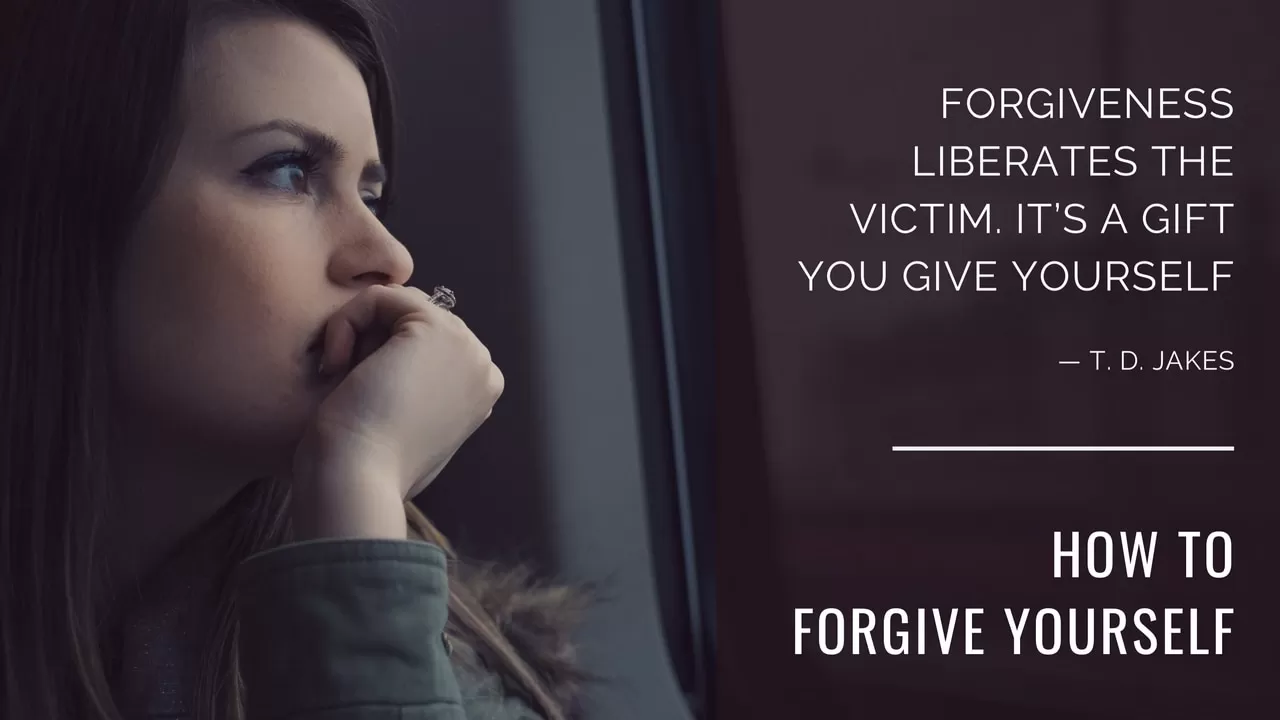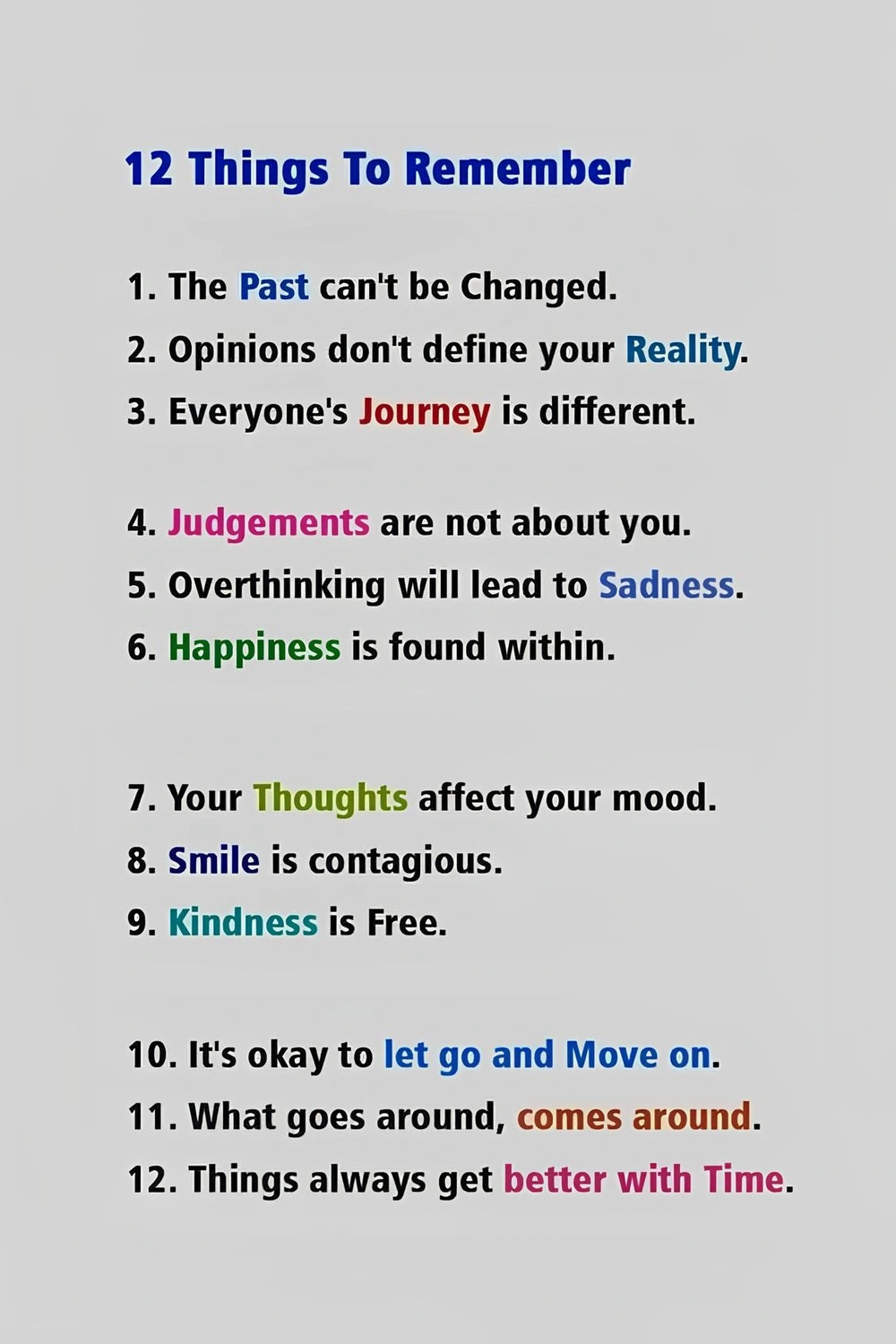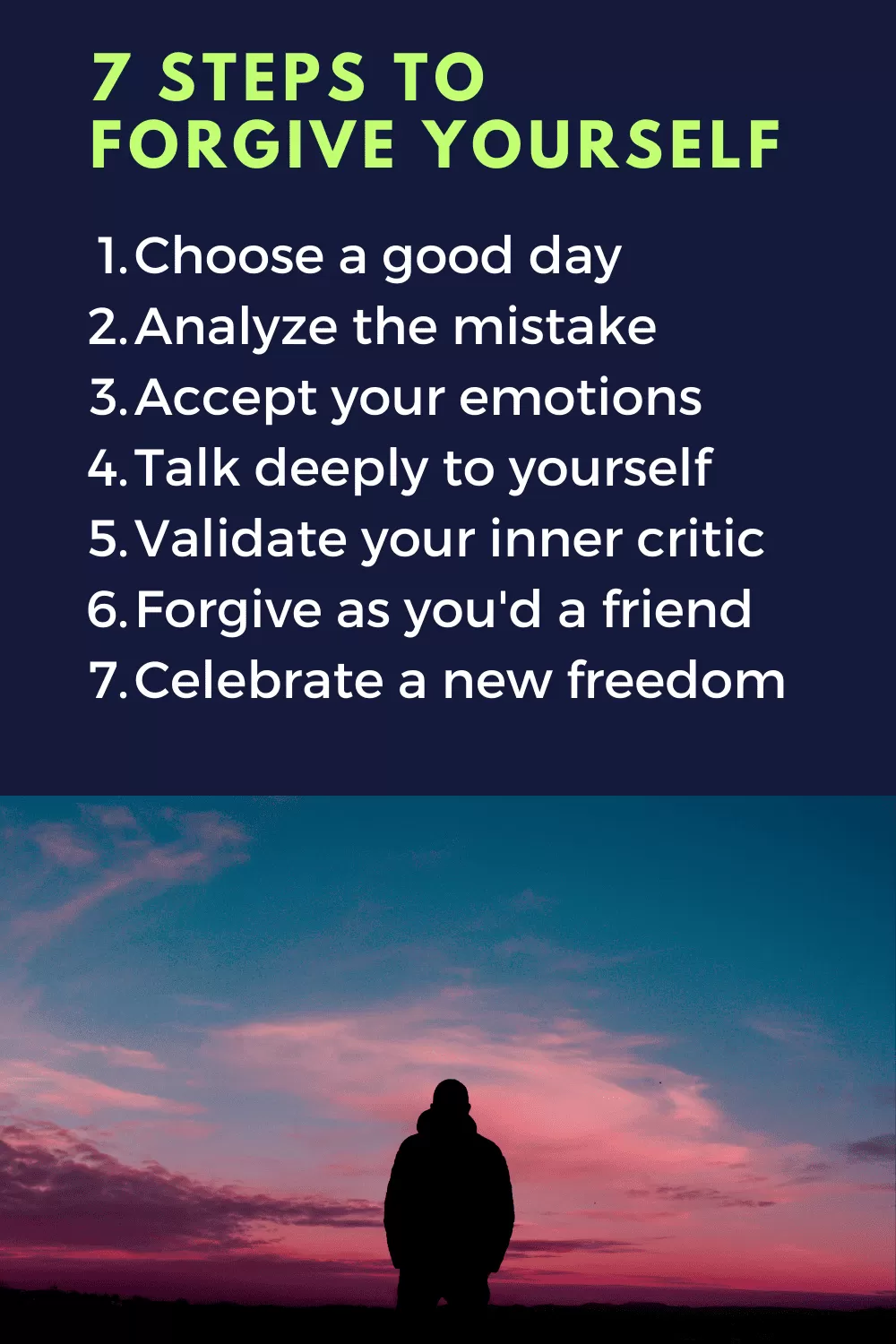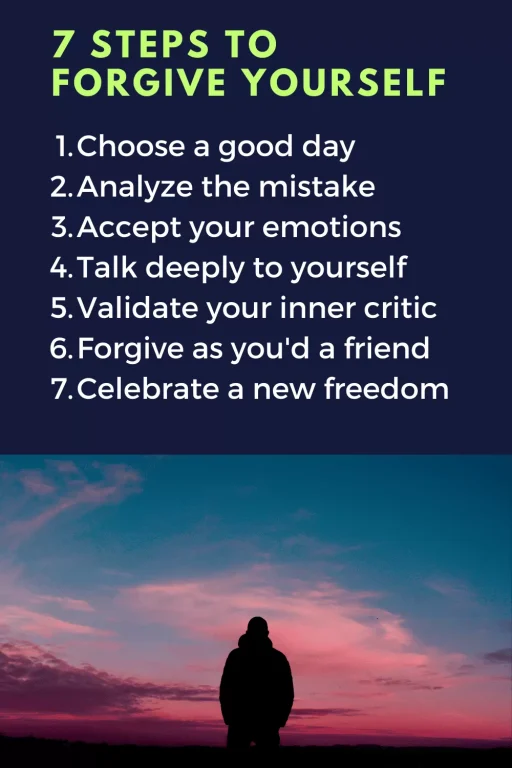Today's Saturday • 11 mins read
— By Dr. Sandip Roy.
You hurt someone in some half-forgotten past, without actually meaning to. The regret and sorrow are still fresh after years, so you can’t forgive yourself even when you have forgiven many others.
You know you’d feel freer and lighter if you could forgive yourself, but it doesn’t seem to come by. Why?
Others don’t have a permanent home in your head; you do. That’s why forgiving yourself, and letting go of the past, is so hard.
You can’t escape your past version of yourself. So you hold yourself hostage and re-read those harsh self-judgments to yourself.
But forgiving yourself doesn’t mean you are skirting your responsibility or condoning yourself for it. It’s a gift you give to yourself.
7 Steps To Forgive Yourself (For Hurting Someone Unintentionally)
Here are the steps to forgive yourself for having hurt someone:
1. Choose A Good Day
Pick a day without too many responsibilities or distractions. This will help you have adequate willpower—which is a limited resource.
- Schedule an appointment with yourself for a day when you won’t have any big tasks to do. Assign at least an hour to it.
- Find a quiet, comfortable space where you can reflect without getting interrupted. Get something to eat or drink. Carry your diary or journal.
- Begin by meditating or deep breathing to move past your daily worries and calm your mind.

2. Analyze The Mistake
Your goal is to analyze the mistake in terms of what you can learn from it.
- Reflect on the situation objectively. Look back at the mistake in an even-handed way. Consider what happened, your role in it, and the circumstances that led to it. Simply go over the whole situation as it unfolded, with an open mind.
- Avoid self-criticism. Criticizing what you did back then is easy. Stop! Don’t judge your past self with present standards. No human is faultless, so give yourself the grace to fail. Rather, use your mental energy to grow from the experience, not stay stuck in guilt or shame.
- Assess your actual control. Ask, “How much control I had over the situation then?” You might be surprised at how little of it was yours to handle. That can help you feel less guilty. But don’t use that to blame others.
- Let it brew: Allow your analysis and the learnings to sink in over a few days. Each time the mistake comes to mind, remind yourself of the lessons learned.
- Tag the lessons. There’s wisdom in what Frank Sonnenberg said, “Lessons in life will be repeated until they are learned.” Find out what you learned, then write down the repeatable and unrepeatable lessons. Because those who can’t remember the past are condemned to repeat it. Set up an action plan to prevent a similar mistake in the future.
If you can’t figure out what lessons to get from the mistake, ask a wise person’s opinion, online or offline. If you can’t, reach out to a mental health counselor.
- What’s the best way to learn from mistakes?
- The best way is to learn from other people’s mistakes.
- The second-best way is to learn from your own mistakes.
3. Accept Your Emotions
Self-forgiveness can bring up a range of emotions like guilt, shame, anger, or sadness. Rather than suppressing these feelings, acknowledge and accept them without judgment.
Emotions are natural responses. Each emotion has a purpose.
- Sadness signals a loss.
- Happiness conveys that something is going well in our life.
- Guilt says that we have violated our own ethical standards or values in some way.
- Anger means we perceive an injustice committed against us or someone we care about.
Letting yourself feel your emotions is part of the healing process. Once you accept the difficult emotions, forgiving yourself is easier.
Guilt vs. Shame: There’s one crucial difference between guilt and shame, despite both being “self-critical” emotions.
- Shame points out we didn’t have the power to live up to our ideal standards (an act of omission).
- Guilt suggests we broke the rules because we had the power as well as intent to do so (act of commission).
4. Have A Deep Talk With Yourself
The self-forgiveness process must involve an honest, introspective dialogue with oneself.
Start a conversation with yourself. Go over in detail why you need to forgive yourself. Remember, it’s easier to forgive a person when you love and care about them.
Let yourself be the person you could love. Learn to love yourself without guilt.
You can’t forgive without loving. And I don’t mean sentimentality. I don’t mean mush. I mean having enough courage to stand up and say, “I forgive. I’m finished with it.”
— Maya Angelou
Self-judgment and self-criticism can make it hard to forgive yourself.
- Love heals, so start with self-love.
- Listen to your neglected self with calmness.
- Don’t judge or interrupt your inner voice, just listen.
These twelve points are helpful reminders when you listen to your inner voice:

If you can’t do it all in your head (frankly, most of us can’t), record or write a dialogue between your inner voice and your conscious voice.
5. Validate Your Inner Critic
Give a great name to the voice in your head.
You already have a fair idea of what your inner critic thinks about it, as you noted them down in the first step.
Give your inner critic a respectful name to call. Now call it by their name, assure it you have listened to them carefully, and take their criticism into account.
And tell them now is the time to go together ahead on this. Be patient. It takes time to understand your inner critic is not against you, but your ally to make you into a better person.
You validated them, and now you need their help in validating your process of forgiving yourself.
Find a confederate or friend or a caring someone in your inner critic by talking to them with compassion and kindness.
And don’t try to change the voice. It’s you who must change, guided by that voice.
By the way, we should also not try to change others.
6. Forgive As You Would A Friend
Imagine you’re speaking to a dear friend who made a similar mistake.
- What would you say to them?
- How would you respond to their struggles to forgive themselves?
Chances are, you would offer them understanding, support, and forgiveness. Apply that same kindness and compassion to yourself – you deserve it just as much as anyone else.
Treat yourself as your best-loved friend.
Forgiving doesn’t mean you are condoning the act. It means you’re releasing yourself from the dark mire of pity and inaction.
So, release yourself. It’s a positive decision to move on from that past, once and for all.
But also take solace in the fact that this one mistake does not define you. Write what you would do differently the next time.
Remember to be self-compassionate, which means treating yourself like you would a good friend. You might read aloud what you’ve written, and make changes if you like.
Give yourself a self-pardon — your mistake was unintentional. This would make the constant pain of your past faults less painful to bear.
7. Celebrate The Newfound Freedom
Self-forgiveness is a courageous act of self-love and personal growth. Celebrate this milestone.
Let go. Your one mistake doesn’t define you.
When you forgive yourself and release yourself from the burden of all those negative emotions, especially anger and resentment, you might feel you have lost a part of yourself.
- What’s the point of regretting an incident you cannot undo?
- Why should you feel sad at letting that part of you go?
You have received the learning from it, so release it. You don’t need those negative emotions anymore, especially now that you made sure it won’t happen again.
- Do something that makes you happy and proud.
- Embrace your present self with empathy and compassion.
- Recognize that you’ve taken a much-needed step in letting go of self-blame.
You have grown from that experience. Now bask in the tranquility of self-forgiveness.

Three Quick Tips For Self-Forgiveness
Take a look at these three quick and easy ways to forgive yourself and let go of regrets:
1. Re-imagine
- Re-imagine the whole situation with a better outcome.
- Visualize how you’d re-do the experience. Journal about what you learned.
- Since the brain can’t differentiate, when you imagine a new outcome, it lets go of the past mistake like any other memory.
2. Apologize
- Say Sorry and repair the connection with the person, if safe.
- Take time to organize your apology words carefully. Practice what to say and how to respond.
- This would allow you to make amends and move ahead instead of replaying hurtful memories.
3. “Stop!”
- Say “Stop!” loudly or silently to stop the train of thought when your mind wanders to that negative situation.
- Use all your five senses to think of a pleasant or funny memory.
- Try the 5-4-3-2-1 technique: Look around and notice 5 things you can see. Notice 4 things you can feel/touch. Listen carefully and notice 3 things you can hear. Notice 2 things you can smell. Finally, notice 1 thing you can taste (you may skip this if nothing is readily available).
How To Help Self-Forgiveness
Self-forgiveness is accepting responsibility, feeling remorse, and taking steps to repair harm or change behavior. The final goal is learning from the mistake while restoring a livable relationship with yourself.
This study suggests two pathways to help this often uncomfortable and sometimes painful process:
- Hedonic pathway through self-compassion. Treating yourself with kindness, recognizing your common humanity, and mindfully holding difficult emotions reduces shame and defensive avoidance. Self-compassion soothes distress, lowers self-criticism, and creates emotional safety that makes it easier to face responsibility and begin restorative actions.
- Eudaimonic pathway via reaffirming transgressed values. Reconnecting with the moral or personal values you violated (e.g., honesty, care, fairness) helps you re-anchor your identity and purpose. By reaffirming and committing to those values, you transform the wrongdoing into a source of meaning and motivation. It helps lasting change, fosters moral repair, and a sense of integrity.
This study found that self-forgiveness has three basic psychological meanings:
- Positive change: Self-forgiveness involves concrete shifts in behavior and attitude — repairing harm, making amends where possible, and choosing healthier responses in future situations. It reduces rumination and self-punishment, allowing motivation toward constructive goals rather than avoidance.
- Wisdom growth: Forgiving oneself fosters greater perspective-taking and emotional regulation; people learn from mistakes and integrate lessons into their worldview. This growth often produces humility, better judgment in similar situations, and a deeper understanding of personal limitations.
- Embodied awareness: Self-forgiveness engages bodily-sensed experiences (relief, tension release, or lingering discomfort) and interoceptive attention to emotions in the moment. Cultivating this awareness helps regulate physiological stress responses and anchors moral learning in felt, not just cognitive, terms.
In positive psychology, forgiveness is a character strength.
Self-forgiveness must come with taking responsibility, accepting the past as unchangeable, learning from the incident, making changes in yourself, and staying watchful of not repeating the same mistake in the future.
To forgive is to set a prisoner free and discover that the prisoner was you.
—Louis B Smedes
The best part is that we can learn to get better at forgiving ourselves. Forgiveness is a skill that we can hone (Nussbaum, 2016).
— Martha Nussbaum, Anger And Forgiveness
Researchers see forgiveness as an emotion-focused coping mechanism to help manage the stress of negative psychological and emotional experiences.
- Research using fMRI brain scans showed that forgiveness can even change the way our brains function.
- This study found that people who scored high on the Heartland Forgiveness Scale (HFS) had better mental health.
- Toussaint & Shields (2016) found that higher levels of forgiveness helped buffer against the negative mental health impacts of lifetime stress, while lower levels of forgiveness were associated with poorer mental health, especially for those who experienced the most severe lifetime stresses.
Final Words
Self-forgiveness in true essence means saying:
- I admit I did wrong to that person.
- I will remember not to repeat the act.
- I forgive myself and let go of my guilt.
- I’ll recall my mistake as a learning experience.
√ Also Read: How To Forgive A Cheater And Move On?
√ Please spread the word if you found this helpful.
» You deserve happiness! Choosing therapy could be your best decision.
...
• Disclosure: Buying via our links earns us a small commission.
